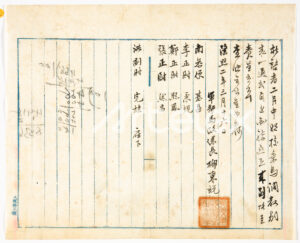Yu Dong-yeol (1879-unknown) was an independence activist, military officer, and politician.
Chief of Staff of the Korean People’s Assembly in Primorsky Krai, Minister of Military Affairs in the Provisional Government of Korea in Shanghai, and Executive Committee Member of the Korean Independence Party.
He was appointed as Cavalry Commander of the Royal Guard and the Chief of the 2nd Division of the General Staff. After the disbandment of the Korean Imperial Army in 1907, he engaged in underground resistance and enlightenment movements.
In 1911, Yu was implicated in the 105-man incident and sentenced to 10 years in prison in the first trial but was acquitted in the second trial. He served 1 year and 6 months in prison before being released. Afterward, he fled to Manchuria, where he continued his independence activities, primarily in Jilin.
In 1918, he joined Seo Il’s Junggwangdan, and in 1919, he signed the Korean Declaration of Independence with figures like Kim Dong-sam and Kim Jwa-jin.
Yu held key positions such as Deputy Chief of Staff of the Provisional Government of Korea in Hanseong,
Chief of Staff of the Korean People’s Assembly in Primorsky Krai, and the first Minister of Military Affairs in the Provisional Government of Korea in Shanghai.
In 1935, he co-founded the Korean National Revolutionary Party in Nanjing, advocating for a united front. In 1938, he was appointed as Executive Committee Member of the Korean Independence Party.
After Korea’s liberation in 1945, Yu returned to Korea and became the first Chief of the Department of National Defense under the U.S. Military Government. During the Korean War, he was abducted at the age of 74.

